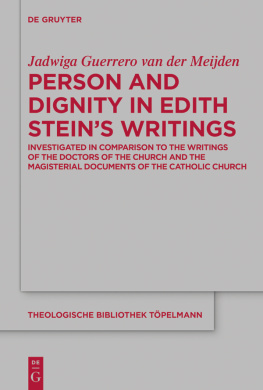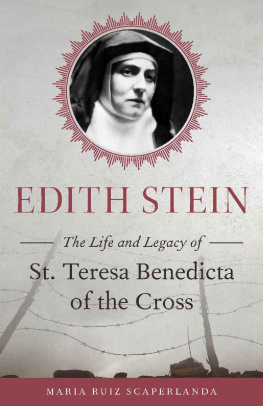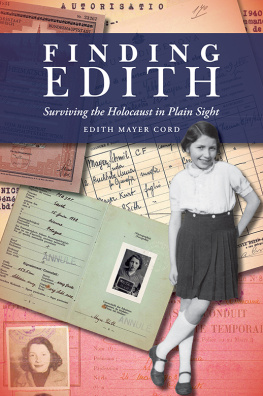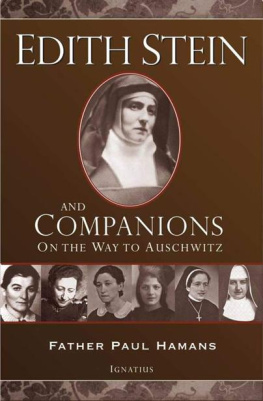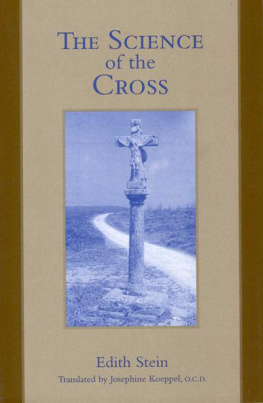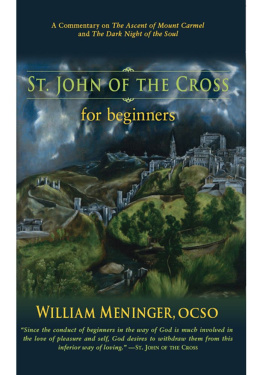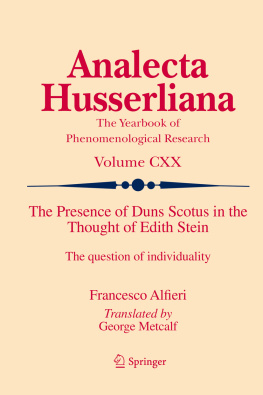The Collected Works of Edith Stein
II
The Collected Works
of
EDITH STEIN
Sister Teresa Benedicta of the Cross
Discalced Carmelite
1891-1942
Edited by
Dr. L. Gelber
and
Romaeus Leuven, O.C.D.
Volume Two
Second Edition, Revised
ICS Publications
Institute of Carmelite Studies
Washington, D.C.
1996
EDITH STEIN
Sister Teresa Benedicta of the Cross
Discalced Carmelite
ESSAYS ON WOMAN
Second Edition, Revised
Translated by Freda Mary Oben, Ph.D.
ICS Publications
Institute of Carmelite
Studies Washington, D.C.
1996
The original of the first edition of this work was published in German by Archivum Carmelitanum Edith Stein under the title of (Band V ) Die Frau
Ihre Aufgabe nach Natur und Gnade.
Translation authorized.
E. Nauwelaerts, Louvain 1959.
The revisions in this second English edition are translated from materials supplied by the Archivum Carmelitanum Edith Stein, from the forthcoming second German edition.
English translation copyright
Washington Province of Discalced Carmelites, Inc. 1987, 1996
ICS Publications
2131 Lincoln Road, N.E.
Washington, D.C. 20002
Library of Congress Cataloging-in-Publication Data
Stein, Edith, 1891-1942.
[Die Frau. English]
Essays on Woman / edited by Lucy Gelber and Romaeus Leuven; translated by Freda Mary Oben. 2nd ed.
p.cm. (The Collected works of Edith Stein; v. 2) Includes index.
ISBN 978-1-939272-01-0
1. WomenEducation. 2. Feminism. 3. Christian womenReligious life. I. Gelber, Lucy. II. Leuven, Romaeus. III. Title. IV. Series: Stein, Edith, 1891-1942. Works. English. 1986; v.2. B3332.S672E541986vol. 2, 1996
[LC1481]
193 sdc20
Contents
Translators Preface
To the Second Edition
O ur world is going through a crisis of dehumanization, breakup of family life, a general loss of moral values . Needed as healing is the spiritual formation of the person stressed by Edith Stein. Her educational insights are more important now than ever. There is no better coverage than hers available concerning human sexuality , personal formation, the relationship between persons and that of persons to God.
The woman will always set the quality of a given time, acting as the demon of the abyss or as a savior for the life about her. Todays woman faces a more dramatic and severe challenge than ever. The family needs her but society needs her also. As a human being, she must fulfill a serious political role along with her maternal one. In these essays, Stein teaches the woman how to be a balanced and fulfilled person in todays world. Her words describe the essence of all women. Yes, the Catholic woman finds much strength in Steins reverence for Mary . Yet, she is analyzing the universal woman objectively because it is the basic nature of woman that she is describing through the phenomenological method.
The man as well will profit from this reading. For the last decades, he has suffered confusion regarding his own role and identity. Young persons desperately need guidance in solving lifes problems and they can find no better friend than Edith Stein. She helps them not only to understand their own beings but to form themselves for their future role as parents.
Perhaps most important of all, Edith Stein nourishes us in our spiritual poverty, the cause of all our personal and social ills. She steers each of us to full humanity. She steers us in our pilgrimage as children of God and citizens of the world.
Freda Mary Oben
Silver Spring, MD
Translators Preface
To the First Edition
G ilbert V. Hartkes dedication to the priesthood was essential in bringing about my conversion from Judaism to Catholicism in 1960. Two years later, it was he who spoke to me of another Jewess who had become a Catholic: Edith Stein, the noted German philosopher and Carmelite, who had been martyred at Auschwitz.
I went quickly to find what I could about her. In those days, twenty-four years ago[from 1987], I did not know German. I undertook the study of the language expressly to read Steins works in the original. The subsequent years have been spent in research and translation in order to make her known through articles and talks to the American public.
The translation of Die Frau which I offer here is the fruit of many years of work. You may ask: What was it which drove me with such force through the years? I was convinced that she was the needed catalyst in our societys confusion concerning the role of woman. Her writings helped me, as a wife and mother of five children, to establish an equilibrium in my family and professional life. I knew she could have a similar effect on others.
I have always felt deeply the pain of the human condition; before my conversion, however, I did not know how to confront it. Through Steins life and her writings, I recognize the unique redemptive role of woman. Stein believes that God combats evil through the power of womans maternal love . That power exists independently of womans marital status and should be extended to all persons with whom she comes in contact. Everywhere, there is a need for such love, and it is essential to womans nature that she give it. Just as the Mother of Christ appeared publicly at the crucifixion, so, too, a woman must be involved today in the struggle between good and evil.
Of course, a factor in my dedication to Edith Stein is our sharing in the Jewish heritage. I share her love for our people. I understand that her fidelity to God, the Holy One both of Israel and of Christ, led her to offer up her life for the chosen people. It is hoped that recognition of her sacrifice will encourage the so desperately needed reconciliation between the two faiths.
I offer my heartfelt gratitude to Father Hartke without whom none of my work could have been done. My thanks, also, to Ferrer Smith, O.P. , who instructed me in the Catholic faith, and I honor the memory of his brother Alan Smith, O.P. , who was the first to hand me a copy of the German edition of Die Frau.
As early as 1974, I was planning this American edition of Die Frau in collaboration with Dr. Lucy Gelber , editor of the Edith Steins Werke and Conservator of the Archivum Carmelitanum Edith Stein in Brussels. Through the years, I have been sustained by her faith and encouragement. I acknowledge the generosity of Dr. Ingrid Merkel of the Catholic University of America who checked my initial translation from the German. I wish to express my deep respect for Dr. John L. Brown, Professor Emeritus of C.U.A., who understood the value of this translation, who never failed to inspire me and spent many hours checking my work. My gratitude to Dr. Thomas Prufer of C.U.A. for his help in the translation of some of the philosophical terms. And my special thanks to Adrian Cooney, O.C.D., for the final editing of the text.
I have tried to tread a middle path by keeping in tension a literal translation and a fluid English style. The latter could have compromised Steins concepts and some freedom has been taken, but any real sacrificing of Steins content has been avoided. In doing so, I honor her own rule of translation: fidelity to the text, a value which she herself maintained as translator from Greek, Latin, English, and French writings. Therefore, I have followed her in using the masculine pronoun in broad impersonal generalizations.


